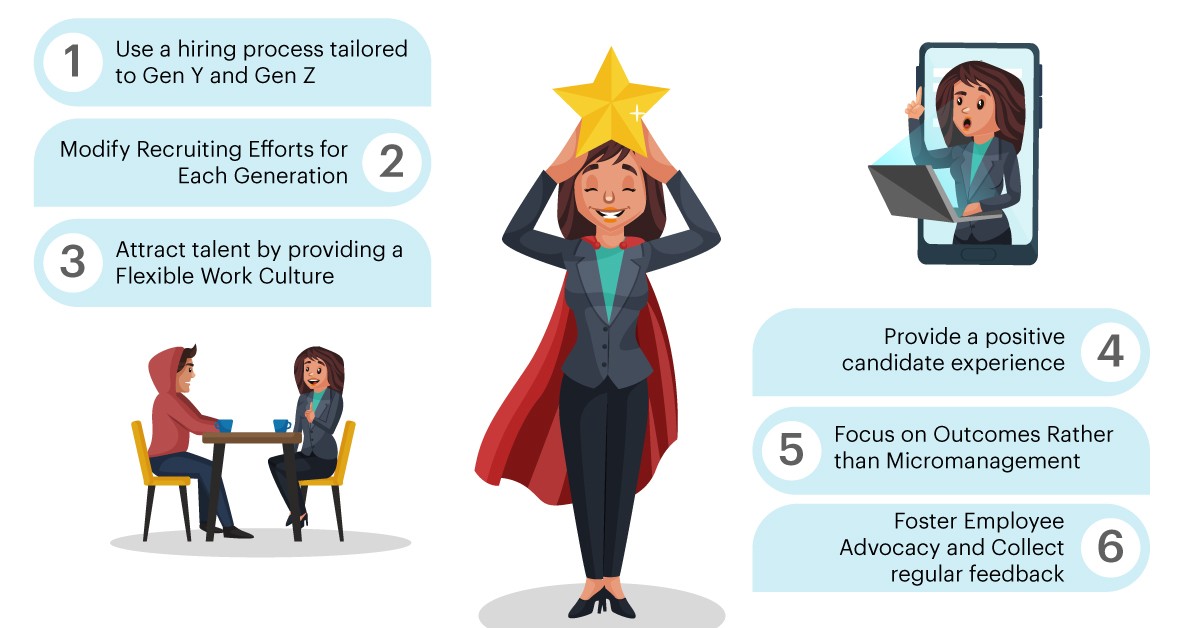Hybrid work
The Superstar HR Formula - A Comprehensive Guide For Gen Y and Gen Z HRs
Sowmya Sankaran / Reading Time : 7 mins
Table of Contents
- GEN Y vs. GEN Z: How Job Seeking Has Changed?
-
- 👉 Use a hiring process tailored to Gen Y and Gen Z:
- 👉 Modify Recruiting Efforts for Each Generation:
- 👉 Attract talent by providing a Flexible Work Culture:
- 👉 Provide a positive candidate experience:
- 👉 Focus on Outcomes Rather than Micromanagement:
- 👉 Foster Employee Advocacy and Collect regular feedback:
In today's fast-paced and ever-changing business world, the Human Resources (HR) landscape is evolving rapidly as the needs and desires of employees change over generations. Gen Y and Gen Z are the prominent generations in the contemporary workforce, and they bring new expectations and challenges for HR professionals.
To be a Superstar HR, professionals need to roll up their sleeves, be adaptable, and go beyond conventional boundaries. Understanding the distinct needs of these two generations is imperative to attract and retain the best talents.
In this blog, let's explore how Gen Y and Gen Z HRs can streamline their strategies using the Superstar HR Formula in this dynamic era to meet the needs of these burgeoning cohorts.
How HR Practices Evolved Over Generations?
Over the years, the HR landscape has undergone a significant evolution, shaped by the characteristics and expectations of each generation. Initially, HR departments mainly operated in a supportive role, emphasising personnel management, administrative tasks, and ensuring compliance with labour laws. HR practices were more traditional, with a focus on administrative tasks, payroll, and compliance. It valued dedication and loyalty to organisations and often preferred hierarchical structures and job stability. Over time, the need to embrace innovative approaches to attract and retain top talent arose.

Gen Y, also known as Millennials, have redefined the role of HR professionals by demanding a greater emphasis on employee experience, technology integration, and innovative talent management strategies. One of the most significant changes is the shift from a hierarchical, top-down management style to a flatter, more collaborative organisational structure.
Born into a hyper-connected world, as Gen Z entered the workforce, HR practices faced yet another wave of change. The rise of social media significantly impacted employer-employee interactions and employer reputation, pushing HRs to incorporate digital platforms for recruitment and employer branding purposes.
The rise of automation gave access to advanced tools and analytics to streamline recruitment processes and virtual onboarding processes, enable data-driven decision-making, and provide insights into employee performance and engagement. With the rise of digitalization, Gen Z prefers remote work and hybrid models. The findings of GoFloaters' study of live booking data demonstrate this, with 80% of workers and 60% of employers preferring hybrid work arrangements.
Check the study here: State of hybrid work report
GEN Y vs. GEN Z: How Job Seeking Has Changed?
- Technological and Digital Fluency:
Being digital natives, both generations are technologically savvy, but their expectations differ significantly. Generation Y witnessed the growth of the internet and embraced technology as it evolved. Generation Z, on the other hand, values the seamless integration of technology into work processes and tends to favour organisations that use advanced tools and software to enhance productivity.
- Work-Life Balance:
Work-life balance and flexibility are integral aspects of both Gen Y and Gen Z job seekers' expectations, but their definitions of these terms may differ. Millennials tend to appreciate work-from-home policies as they value a healthy balance between work and leisure, and they seek employers that prioritise employee well-being and offer support programs.
In contrast, Gen Z, being more entrepreneurial and independent-minded, may prioritise remote work options and flexible working hours, which enable them to better manage their personal and professional lives.
- Career Growth and Development:
Both Gen Y and Gen Z job seekers value professional development and meaningful career growth opportunities. However, the approach to career advancement may differ slightly. Millennials, who entered the workforce during economic instability, sought job security and continuous learning as means of career progression. In contrast, Gen Z job seekers tend to prioritise opportunities for immediate impact and value workplaces that offer rapid career growth prospects.
- Workplace Diversity and Inclusion:
Diversity and inclusion are non-negotiable factors for both generations. Millennials have been at the forefront of promoting workplace diversity, demanding equal representation and inclusivity. Gen Z, growing up in a more diverse world, is even more adamant about working for organisations that value and celebrate differences, which can be seen practised through organisations like Nas Daily.
The Superstar HR Formula
Gen Y and Gen Z HR professionals play a crucial role in striking the right balance between the human touch and technological efficiency in organisations. To excel in talent acquisition and retention, HRs need a strategy plan to address the challenges. A formula that considers the unique qualities and expectations of today's job seekers, who have different expectations than their previous generations.

The Superstar HR Formula is precisely that. It is a comprehensive guide that bridges the generational gap, paving the way for Gen Y and Gen Z HR professionals to become superstars. Let's unveil the Superstar HR Formula curated for HRs to stay ahead of the curve in the ever-changing world of work.
👉 Use a hiring process tailored to Gen Y and Gen Z:
Gen Y and Gen Z are two very different generations, and they have different needs and expectations when it comes to work. Companies like Google offer a tailored hiring process for Gen Y and Gen Z job seekers.
For example, Google uses a variety of methods to attract and recruit Gen Y and Gen Z talent accordingly. This includes Campus recruiting, Social media platforms like LinkedIn, Twitter, and Instagram to reach out to job seekers. Google hosts virtual events and webinars to give Gen Z job seekers a chance to learn more about the company and its culture. Google's job descriptions are tailored to Gen Ys and Gen Zs interests and needs. By tailoring their hiring process to the needs and interests of HRs can hire the best candidate for the job.
👉 Modify Recruiting Efforts for Each Generation:
Once the unique needs and expectations of each generation are understood, recruiting efforts can be tailored accordingly. For Gen Y, platforms like LinkedIn are popular for professional networking and job hunting. Sharing authentic employee experiences on these platforms or offering internships or fellowships are powerful ways to attract Gen Y candidates.
On the other hand, Gen Z is drawn to visually engaging platforms like Instagram and Facebook. HRs can create short videos highlighting the company's culture, diversity initiatives, and employee success stories to appeal to Gen Z candidates.
👉 Attract talent by providing a Flexible Work Culture:
Establish a work culture that embraces flexibility as a core value. Gen Y and Gen Z highly value the ability to work on their own terms. Based on a recent case study, there has been a dynamic increase of 300% in booking hybrid work arrangements, as they offer flexibility that boosts employee satisfaction and productivity. You should read about this trend influencing the future of work here: Future of work model in India
Companies like inFeedo claim that offering remote and hybrid work options result in better engagement and results with their employees. So, spice up with a mix of WFH and hybrid work options, allowing employees to choose the setup that best suits their work style.
Watch our interaction with inFeedo here
👉 Provide a positive candidate experience:
HR professionals can create an atmosphere where Gen Ys and Gen Zs can remain productive and engaged while also feeling valued and supported by understanding each their needs accordingly.
Through initiatives like providing flexible work hours, training courses, and wellness programs, companies such as Zoom, Netflix, and Zappos have demonstrated that they understand the importance of creating a positive work culture and candidate experience.
By demonstrating to employees that their employer genuinely cares about their wellness and values their efforts, such programmes not only serve to foster an environment where they may thrive but also ultimately boost collaboration, productivity, and satisfaction at work.
👉 Focus on Outcomes Rather than Micromanagement:
Gen Y and Gen Z candidates are attracted to companies that embrace hybrid work models as they highly value work-life balance. HRs can highlight the flexibility to adapt work hours to suit individual needs. Illustrate how employees can strike a balance between personal and professional commitments, leading to enhanced well-being and productivity. Emphasizing the benefits of flexibility, work-life integration, and employee well-being will resonate with the values of these generations as they appreciate autonomy.
👉 Foster Employee Advocacy and Collect regular feedback:
Encourage employees to share their positive experiences on social media and professional networks. Employee advocacy can be a powerful tool for attracting like-minded candidates best suited for the designation.
Also, get input from the hired candidates or the existing workforce on new ideas that HRs can implement. Remember that individual preferences may still vary, so adaptability and openness to feedback are crucial for continuous improvement.
Conclusion
As the modern workforce continues to diversify, understanding the distinct expectations of Gen Y and Gen Z job seekers is crucial for HRs. The Superstar HR Formula offers a holistic approach for HR professionals to recruit the best candidates from Gen Y and Gen Z. Understanding the unique qualities and expectations of these generations empowers HR professionals to make informed decisions and foster an inclusive, dynamic, and successful work environment.
HR professionals can attract top talent from Gen Y and Gen Z by providing enticing remote work options through a well-defined hybrid work model. Demonstrating the company's commitment to flexibility, work-life balance, technology, and employee growth will make your organisation stand out as a desirable employer for these generations.
